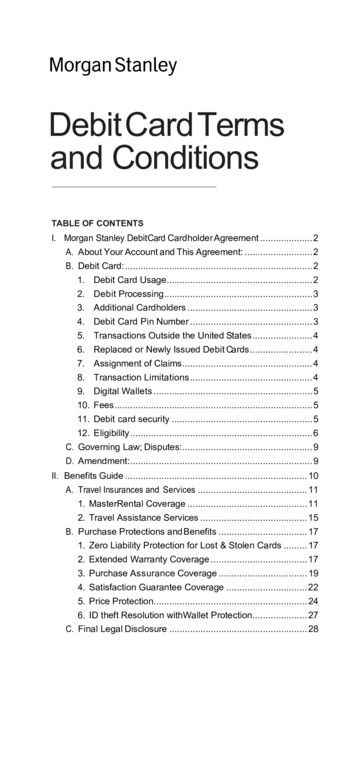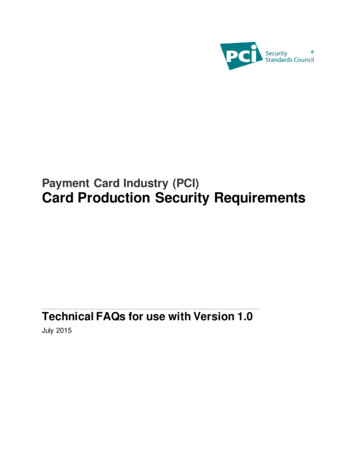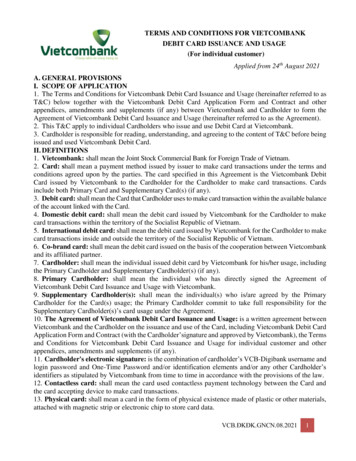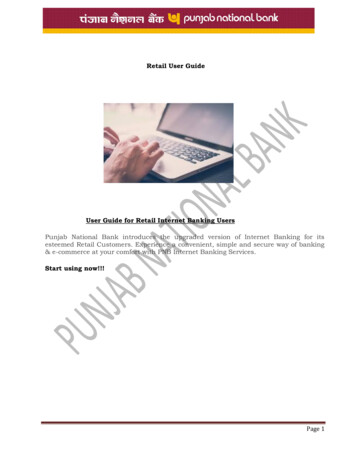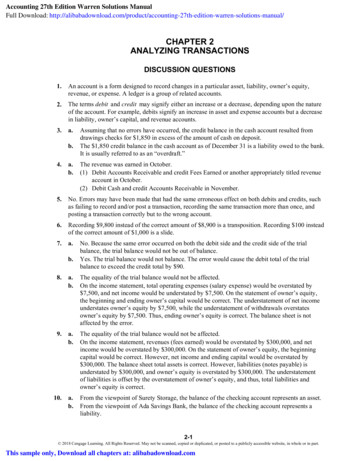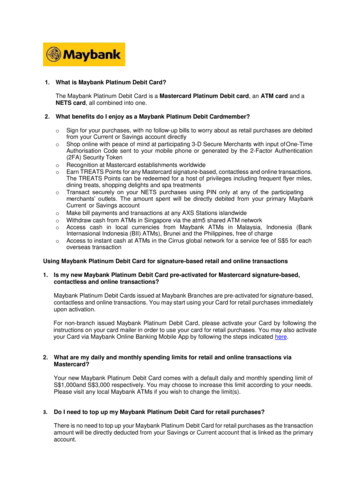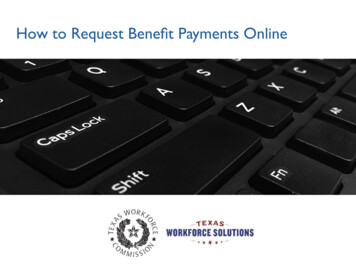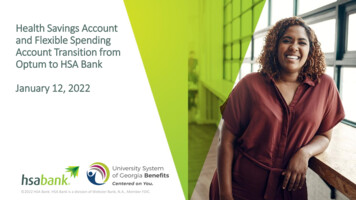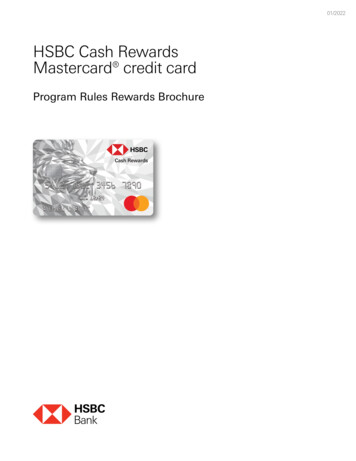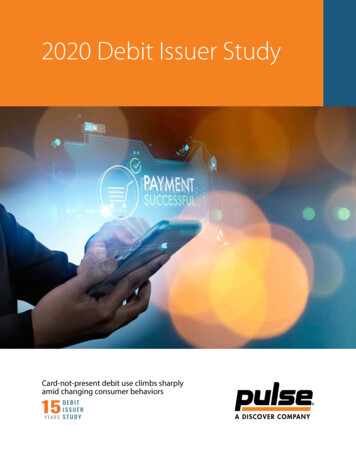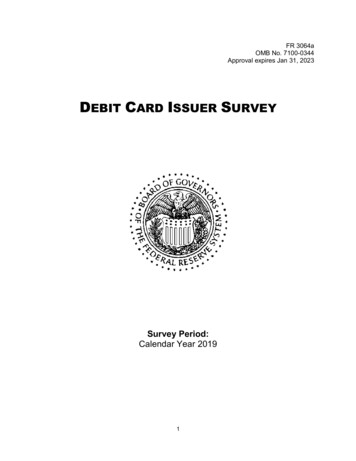
Transcription
FR 3064aOMB No. 7100-0344Approval expires Jan 31, 2023DEBIT CARD ISSUER SURVEYSurvey Period:Calendar Year 20191
General InstructionsAbout this SurveySection 235.8(b) of the Federal Reserve Board’s Regulation II requires that issuers covered by theinterchange fee standards in Regulation II file reports with the Board. This survey serves as this report.The survey solicits information from calendar year 2019 regarding (1) volumes and values of debit cardtransactions; (2) volumes and values of chargebacks and returns to merchants; (3) the costs incurred inconnection with the authorization, clearance, and settlement of debit card transactions; (4) other costsincurred in connection with particular debit card transactions; (5) costs incurred by debit card issuers toprevent fraud in debit card transactions; (6) interchange fees charged or received by debit card issuers inconnection with debit card transactions; and (7) the incidence and loss associated with fraudulent debitcard transactions. For purposes of this survey, transactions over three-party systems are not included.If an issuer that is covered by the interchange fee standards in Regulation II at the time of this datacollection was not also covered in 2019, it does not need to file a report with information for calendar year2019. Such an issuer should contact the Board noting its status in 2019 through the communicationchannels provided belowIn addition, Section 235.8(c) of the Federal Reserve Board’s Regulation II requires that issuers coveredby the interchange fee standards in Regulation II retain records that demonstrate compliance with therequirements of Part 235 for not less than five years after the end of the calendar year in which the debitcard transaction occurred.Your ParticipationTo achieve the most reliable results, it is important that you respond completely and accurately. Pleaseleave no survey item blank.There are three possible ways to answer a survey question:Enter a Value: The actual numeric value of the data element.Enter a Zero: When the calculated value equals zero. Please do not enter a non-numericvalue, e.g. “NA” or “NR,” when the value equals zero.Enter “NR” (Not Reported): If your institution engages in the activity of the type beingmeasured but you are unable to report a figure that reflects that activity.Please do not enter “NA.”If for any reason you cannot provide complete data or you have questions please contact(866) 359-6619 or e-mail debit.card.surveys@frb.gov for assistance.The survey will be made available online at ease complete the survey by August 31, 2020.Response Confidentiality and BurdenThe Federal Reserve Board regards the individual organization information provided by each respondentas confidential (5 U.S.C. § 552(b)(4)). The Board, however, may publish aggregate or summaryinformation in a way that does not reveal your individual organization’s confidential information. If itshould be determined subsequently that any information collected on this form must be released, therespondents will be notified.Public reporting burden for this collection of information is estimated to be 200 hours per response,including the time to gather data in the required form and to review instructions and complete the2
information collection. Send comments regarding this burden estimate or any other aspect of thiscollection of information, including suggestions for reducing the burden, to Secretary, Board of Governorsof the Federal Reserve System, 20th and C Streets, N.W., Washington, D.C. 20551, or via email toregs.comments@frb.gov; and to the Office of Management and Budget, Paperwork Reduction Project(7100-0344), Washington, D.C. 20503. The Federal Reserve may not conduct or sponsor, and anorganization (or a person) is not required to respond to, a collection of information unless it displays acurrently valid OMB control number.3
Section I:Respondent Information1. Name of the debit card issuer covered in this response2. Contact person(s) by section of the survey for which oneNameEmailSectionPhoneNameEmailSectionPhone4
Section II: All Debit Card Transactions(including general-use prepaid card transactions)Please enter totals only for transactions and associated costs related to debit cards linked to U.S.-domiciledaccounts involving a merchant located in the United States during the calendar year (CY) 2019.Include:All debit card transactions (including general-use prepaid card transactions).Both consumer and business card transactions.Do Not Include: ATM or credit card transactions.1. CY 2019 debit card transactions (includinggeneral-use prepaid card transactions)1a.Value ( )VolumeValue ( )Settled purchase transactions (excludingpre-authorizations, denials, adjustments, returns,and cash back amounts)Card-present vs. card-not-present transactions1b.VolumeAllocate “1a. Settled purchase transactions”between the following categories:1a:1a:1b.1 1b.2 1a1b.1Card-present transactions1b.2Card-not-present transactionsGeneral-use prepaid card transactions vs. allother debit card transactions1c.Allocate “1a. Settled purchase transactions”between the following categories:1c.1 1c.2 1a1c.1General-use prepaid cardtransactions1c.2All other debit card transactions5Volume1a:Value ( )1a:
General-use prepaid card exemption:Exempt vs. non-exempt general-use prepaidcard transactions1d.Allocate “1c.1 General-use prepaid cardtransactions” between the following categories:Volume1c.1:Value ( )1c.1:1d.1 1d.2 1c.11d.1General-use prepaid card transactionsexempt from the interchange feestandards.1d.2General-use prepaid card transactions notexempt from the interchange feestandards.2. CY 2019 chargebacks and returnsVolume2a.Total chargebacks to acquirers2b.Allocate “2a. Total chargebacks to acquirers”between the following categories:Report all chargebacks settled in CY 2019 regardless ofthe date the original purchase transaction took place.2b.1 2b.2 2a2c.Value ( )2b.1Fraud-related chargebacks2b.2All other chargebacks (not related tofraud )Total returns from acquirersReport all returns sent in CY 2019 regardless of the datethe original purchase transaction took place.62a:2a:
Specific Instructions for Question 3:Include:Costs of authorization, clearance, and settlement of all purchase transactions, chargebacks,returns, and other non-routine transactions (e.g. errors).Both costs associated with interbank settlement and account posting.All fixed and variable cost components—see glossary.In-house costs (including costs incurred by affiliated processors—see glossary), networkprocessing fees, and third-party processing fees.Examples of in-house costs: Labor, equipment/hardware, and software associated withauthorization, clearance, and settlement of debit card transactions.Examples of third-party processing fees: Billed processing fees net of any rebates receivedtied to the authorization, clearance, and settlement of debit card transactions. This shouldinclude billing for returns, chargebacks, and other error processing.Examples of network processing fees: Switch fees and any other billed network fees tied to theauthorization, clearance, and settlement of debit card transactions net of any rebates received.Do Not Include: Any costs that are not specifically related to the authorization, clearance, and settlement ofpurchase transactions, chargebacks, and other non-routine transactions. For example, do notinclude costs related to corporate overhead, account relationships, rewards programs, nonsufficient funds handling, non-sufficient funds losses, cardholder inquiries, card production anddelivery, or fraud losses. Also, do not include fraud-prevention costs, even if those costs areincurred as part of authorization. In the case of general-use prepaid card transactions, do notinclude costs associated with funds loads or account set-up and maintenance.For fees paid for third-party services such as processors and networks and network fees:Report actual costs net of any rebates received.For capital expenditures associated with authorization, clearance, and settlement:Report costs that were depreciated or amortized during 2019 using the U.S. Generally Accepted AccountingPrinciples (GAAP) or the International Financial Reporting Standards (IFRS).For costs shared with other card programs or activities:Allocate the costs based on the number of transactions. For example, if your institution has shared costs for debitand credit card operations, allocate those costs to debit card operations based on the proportion of debit cardtransactions to total debit and credit card transactions.For in-house costs incurred as a result of outsourcing to an affiliated processor under the same holdingcompany:Report costs incurred by the issuer, provided that the costs of the issuer are determined in a way that isconsistent with fees that the affiliated processor would charge to an unaffiliated debit card issuer.7
3. CY 2019 costs of authorization, clearance, andsettlement3a.Costs of authorization, clearance, andsettlement3b.Allocate “3a. Costs of authorization,clearance, and settlement” between thefollowing categories:Dollars ( )3a:3b.1 3b.2 3b.3 3a3c.3b.1In-house costs3b.2Third-party processing fees3b.3Network processing feesDoes your institution outsource processing to aprocessing affiliate under the same holdingcompany?[] Yes[] NoDoes your answer in “3a. Costs ofauthorization, clearance, and settlement”include an allocation of the debit card portion ofshared costs?[] Yes[] NoIf yes, costs should be included as in-house costs in3b.1.3d.If yes, please comment on what types of costs are shared and with which other activity(ies):8
Specific Instructions for Question 4:Include:All relevant costs that are associated with debit card transactions.All fixed and variable cost components.Examples for cardholder inquiries: Inquiries about transactions details, errors, andpotential fraudulent activity.Examples for cardholder rewards: Rewards paid out to cardholders during 2019 even ifthose rewards were not earned in 2019.Examples for non-sufficient funds handling: Costs of collection activities and reporting theaccount to credit agencies.Do Not Include: Any costs that are NOT associated with debit card transactions.Examples for cardholder inquiries: Inquiries regarding account balances, rewardsprograms, credit card transactions, and ATM transactions.Examples for cardholder rewards: Rewards program administration costs and affinitypartner revenue-sharing, and rewards earned by cardholders in 2019, but not paid out in2019.Examples for non-sufficient funds handling: Amount of or losses from such transactions.For capital expenditures:Report costs that were depreciated or amortized during 2019 using the U.S. Generally Accepted AccountingPrinciples (GAAP) or the International Financial Reporting Standards (IFRS).For costs shared with other card programs or activities:For cardholder inquiries: Allocate the costs based on the number of inquiries. For example, if your institutionhas a shared call center for debit and credit cards, allocate those costs to debit card transactions based onthe proportion of inquiries related to debit card transactions relative to total cardholder inquiries.For non-sufficient funds handling: Allocate the costs based on the number of non-sufficient fundstransactions. For example, if your institution has shared costs for non-sufficient funds handling of debit cardand check transactions, allocate those costs to debit card operations based on the proportion of nonsufficient funds debit card transactions to total non-sufficient funds transactions9
4. CY 2019 costs associated with a particulardebit card transaction that are notauthorization, clearance, and settlement costsDollars ( )Cardholder inquiries4a.Costs of cardholder inquiries associated withparticular debit card transactions4b.Allocate “4a. Costs of cardholder inquiriesassociated with particular debit card transactions”between the following categories:4a:4b.1 4b.2 4a4b.1Costs related to possible fraudulentdebit card transactions4b.2Costs not related to possible fraudulentdebit card transactionsCardholder rewards4c.Dollars ( )Costs of cardholder rewards associated withparticular debit card transactionsDollars ( )Non-sufficient funds handling4d.Costs of non-sufficient funds handlingassociated with particular debit card transactions10
5. CY 2019 fraud-prevention and data-securitycosts5a.Total fraud-prevention and data-securitycostsLess: 5a.1toTransactions monitoring costs tiedauthorizationLess: 5a.2Your answer to “4b.1 Costs related topossible fraudulent debit cardtransactions”5b.Dollars ( )4b.1:Fraud-prevention and data-security costsnet of transactions monitoring andcardholder inquiry costs5b 5a – 5a.1 – 4b.15c.Fraud-prevention activitiesBelow are some common fraud-prevention activities thatan issuer may engage in. The list is not meant to beexhaustive but rather serves as a way to track theprevalence of existing fraud-prevention techniques.Check all that apply.[] Transaction monitoring[] Merchant blocking[] Data-security[] PIN customization[] Tokenization[] OtherOther fraud-prevention activities:In order to track both existing and emerging fraud-prevention and detection techniques, please listactivities not listed above and provide a brief description.11
6. CY 2019 interchange fee revenueDollars ( )6a.Total interchange fee revenue received(gross interchange fee revenue)6b.Interchange fees reimbursed to acquirersas a result of chargebacks or returns6c.Net interchange fee revenue received(6c 6a - 6b)12
7. CY 2019 fraudulent transactions: number7a.Total number of fraudulent transactions7b.Allocate “7a. Total number of fraudulenttransactions” between the following categories:Number7a:To the extent possible, include each fraudulenttransaction in only one category consistent with howyour institution categorizes the loss associated with thefraudulent st and stolen7b.4OtherPlease describe the types of fraudulent transactions included in “7b.4 Other”:To the extent possible, list the type of fraud and the number of transactions associated withthat fraud.13
8. CY 2019 fraud losses: value (all types)8a.Dollars ( )Gross value of fraudulent transactionsLess: 8a.1Fraud-related chargebacks toacquirers net of representmentsReport all chargebacks sent in CY 2019regardless of the date the original purchasetransaction took place.Less: 8a.28b.Losses absorbed by cardholdersReport all losses absorbed in CY 2019regardless of the date the original purchasetransaction took place.Losses incurred by issuer8b 8a – 8a.1 – 8a.29. CY 2019 fraud losses: value (card-not-present)9a.Gross value of fraudulent transactionsLess: 9a.1Fraud-related chargebacks toacquirers net of representmentsReport all chargebacks sent in CY 2019regardless of the date the original purchasetransaction took place.Less: 9a.29b.Losses absorbed by cardholdersReport all losses absorbed in CY 2019regardless of the date the original purchasetransaction took place.Losses incurred by issuer9b 9a – 9a.1 – 9a.214Dollars ( )
10. CY 2019 fraud losses: value (counterfeit)Dollars ( )10a. Gross value of fraudulent transactionsLess: 10a.1 Fraud-related chargebacks toacquirers net of representmentsReport all chargebacks sent in CY 2019regardless of the date the original purchasetransaction took place.Less: 10a.2 Losses absorbed by cardholdersReport all losses absorbed in CY 2019regardless of the date the original purchasetransaction took place.10b. Losses incurred by issuer10b 10a – 10a.1 – 10a.211. CY 2019 fraud losses: value (lost and stolen)11a. Gross value of fraudulent transactionsLess: 11a.1 Fraud-related chargebacks toacquirers net of representmentsReport all chargebacks sent in CY 2019regardless of the date the original purchasetransaction took place.Less: 11a.2 Losses absorbed by cardholdersReport all losses absorbed in CY 2019regardless of the date the original purchasetransaction took place.11b. Losses incurred by issuer11b 11a – 11a.1 – 11a.215Dollars ( )
12. CY 2019 fraud losses: value (other)Dollars ( )12a. Gross value of fraudulent transactionsLess: 12a.1 Fraud-related chargebacks toacquirers net of representmentsReport all chargebacks sent in CY 2019regardless of the date the original purchasetransaction took place.Less: 12a.2 Losses absorbed by cardholdersReport all losses absorbed in CY 2019regardless of the date the original purchasetransaction took place.12b. Losses incurred by issuer12b 12a – 12a.1 – 12a.216
Section III: All Single-Message Debit Card Transactions(excluding general-use prepaid card transactions)Exact copy of Section II (except 1c and 1d would be removed) but forsingle-message debit programs only.Section IV: All Dual-Message Debit Card Transactions(excluding general-use prepaid card transactions)Exact copy of Section II (except 1c and 1d would be removed) but fordual-message debit programs only.Section V: General-Use Prepaid Card TransactionsExact copy of Section II except 1c will be modified to include abreakout of single-message and dual-message transactions as below,and 1d would be removed.General-use prepaid card transactionsprocessed over single-message vs. dualmessage payment card networks1c.Allocate “1a. Settled purchase transactions”between the following categories:1c.1 1c.2 1a1c.1Single-message transactions1c.2Dual-message transactions17Volume1a:Value ( )1a:
Glossary of TermsAcquirer: A person that contracts directly or indirectly with a merchant to provide settlement for themerchant’s electronic debit transactions over a payment card network. An acquirer does not includea person that acts only as a processor for the services it provides to the merchant.Cardholder inquiries associated with debit card transactions: Cardholder communicationwith a debit card issuer related to specific debit card transactions, such as inquiries abouttransactions details, errors, and potential fraudulent activity. These do not include inquiries that arenot related to specific debit card transactions, such as inquiries about account balances, rewardsprograms, credit card transactions, and ATM transactions.Cardholder rewards: Incentive payments given to cardholders as a result of particular debit cardtransactions.Card-not-present fraud: Fraud related to card-not-present transactions.Card-not-present transaction: Settled purchase transaction where the purchaser does notphysically present the card to the merchant, such as an Internet, telephone, or mail order transaction.Card-present transaction: Settled purchase transaction where the purchaser physically presentsthe card to the merchant.Chargeback: Transaction initiated by the issuer that reverses a purchase transaction, in whole or inpart (due, for example, to customer disputes, fraud, processing errors, authorization issues, and nonfulfillment of copy requests), and transfers value from the acquirer to the issuer.Costs of authorization, clearance, and settlement: These costs include in-house costs, thirdparty processing fees, and network processing fees. These costs do not include, for example, costsrelated to corporate overhead, account relationships, rewards programs, non-sufficient fundshandling, non-sufficient funds losses, cardholder inquiries, card production and delivery, fraud losses,and fraud-prevention costs, even if those costs are incurred as part of authorization. These costs donot include costs associated with funds loads (or deposits) or account set-up and maintenance.These costs should be provided for purchase transactions, chargebacks, and other non-routinetransactions.Counterfeit fraud: Fraud identified as having occurred through the use of a counterfeit reproductionof a debit card.Debit card: Any card or other payment code or device, issued or approved for use through a paymentcard network to debit an account, regardless of the means of authorization, and regardless of whetherthe issuer holds the account. A debit card includes any general-use prepaid card. It does not include(1) any card or other payment code or device that is redeemable upon presentation at only a singlemerchant, or an affiliated group of merchants for goods or services, or (2) a check draft or similarpaper instrument, or an electronic representation thereof.Debit card transaction: Use of a debit card (including a general-use prepaid card) by a person as aform of payment in the United States to initiate a debit to an account. It does not include transactionsinitiated at an ATM.Dual-message transaction: Transaction type by which authorization information is carried in onemessage and clearance information is carried in a separate message. Traditionally, thesetransactions have been authenticated with a signature.18
Exempt general-use prepaid card transaction: Transaction using a general-use prepaid cardthat is exempt from the interchange fee standards in Regulation II, specifically (1) a transaction madeusing a general-use prepaid card that has been provided to a person pursuant to a federal, state, orlocal government-administered payment program through which the cardholder may use the debitcard only to transfer or debit funds, monetary value, or other assets that have been provided pursuantto such program; (2) a transaction made using a general-use prepaid card that is (i) not issued orapproved for use to access or debit any account held by or for the benefit of the cardholder (otherthan a subaccount or other method of recording or tracking funds purchased or loaded on the card ona prepaid basis), (ii) reloadable and not marketed or labeled as a gift card or gift certificate, and (iii)the only means of access to the underlying funds, except when all remaining funds are provided tothe cardholder in a single transaction.Fixed costs: Costs that do not vary with changes in the number or value of transactions over thecourse of the reporting period. For in-house fixed costs, these include all capital expenditures thatwere depreciated or amortized. For third-party processing fees, these include fees that are notassessed on a per-transaction or ad valorem basis. For example, fees associated with minimumvolume commitments to third-party processors should be reported as fixed costs.Fraud-related chargeback: The value of a fraudulent debit card transaction that is charged back toacquirers.Fraud-related chargebacks to acquirers net of representments: The value of fraudulentdebit card transactions that are charged back to acquirers less the value of representments made byacquirers to debit card issuers.General-use prepaid card: A card or other payment code or device that is (1) issued on a prepaidbasis in a specified amount, whether or not that amount may be increased or reloaded, in exchangefor payment and (2) redeemable upon presentation at multiple unaffiliated merchants for goods orservices. NOTE: An institution is an issuer of a general-use prepaid card if that institution serves asa BIN sponsor for a prepaid card program such that (1) the institution authorizes the cardholder touse the card to perform electronic debit card transactions that access the funds in a pooled account,and (2) the cardholder’s relationship is with that institution. Include in your response informationregarding prepaid cards for which your institution serves as a BIN sponsor in this way.Gross value of fraudulent transactions: The total value of fraudulent debit card transactionsbefore any recoveries or chargebacks.In-house costs: Costs of authorization, clearance, and settlement functions that are not outsourced tothird parties. Include costs incurred by the card issuer or its affiliated processor (i.e., a processor inthe same holding company).Losses absorbed by cardholders: The value of losses that an issuer recovers from itscardholders. Include any chargebacks to cardholder accounts.Lost and stolen fraud: Fraud identified as having occurred through the use of a lost or stolen debitcard.Network processing fees: Total fees charged by payment card networks for services that arerequired for the network processing of transactions. They do not include any fees for optionalservices related to transaction processing that may be provided by a payment card network or anaffiliate of a payment card network. They do not include any network fees, such as membership orlicense fees, that are not directly linked to the processing of transactions.19
Non-sufficient funds handling costs: Costs of handling of events in which an account does nothave enough funds to settle an authorized debit card transaction between the time of authorization ofthat transaction and the settlement of that transaction.Return: Transaction initiated by the acquirer that reverses a purchase transaction, in whole or in part(due, for example, to the return of goods and services by the cardholder), and transfers value fromthe acquirer to the issuer.Settled purchase transaction: A debit card transaction that has been settled. Excludetransactions that are pre-authorizations, denials, adjustments, returns. Exclude cash back value butnot transactions.Single-message transaction: Transaction type by which authorization and clearance information iscarried in one message. Typically, these transactions are authenticated with a PIN.Third-party processing fees: Fees paid to unaffiliated service providers for services related to theauthorization, clearance, and settlement of debit card transactions that are performed by thoseservice providers on behalf of the debit card issuer. Service providers may include payment cardnetworks or affiliates of payment card networks to the extent that such parties provide optionalservices related to transaction processing. They do not include other fees charged by a paymentcard network for services that are required for the network processing of transactions or fees chargedby an affiliated processor (i.e., a processor in the same holding company).Three-party systems: Systems where debit transactions are processed by an entity that acts assystem operator and issuer, and may also act as the acquirer.Total fraud-prevention and data-security costs: Costs related to activities aimed at identifyingand preventing debit card fraud, costs related to the monitoring of the incidence of, reimbursementsreceived for, and losses incurred from debit card fraud, costs related to responding to suspected andrealized debit card fraud in order to prevent or limit losses, costs incurred in securing the dataprocessing and communications infrastructure of debit card operations, and costs incurred in thedevelopment or improvement of fraud-prevention technologies.Total interchange fee revenue received: Total value of fees received that are established,charged, or received by a payment card network and paid by a merchant or an acquirer for thepurpose of compensating an issuer for its involvement in the debit card transaction.Total number of fraudulent transactions: The total number of all fraudulent debit cardtransactions identified by the issuer. Include fraudulent transactions charged back to acquirers.Transactions monitoring costs: Costs related to programs that monitor transactions in order toassist in the authorization process by providing information to the issuer before the issuer decides toapprove or decline the transaction. These costs include the costs of neural networks and fraud-riskscoring systems.United States: The states, territories, and possessions of the U.S., the District of Columbia, theCommonwealth of Puerto Rico, or any political subdivision of any of the foregoing.Variable cost: Costs that directly vary with the number or value of transactions over the course of thereporting period. In-house variable costs, for example, may include certain labor costs. Variablecosts related to third-party processing fees are those fees assessed on a per-transaction or advalorem basis.20
Frequently Asked QuestionsQ: I forgot my log-in credentials and cannot access the survey. What should I do?A: Contact us at debit.card.surveys@frb.gov referencing the DCI survey and we will be glad to assist you.Q: Who needs to fill out the Debit Card Issuer (DCI) survey?A: Any debit card issuer with assets over 10 billion as of 12/31/2018.Q: What is the deadline to fill out the survey?A: You are required to fill out the survey by August 31, 2020. The deadline was extended from May 1, 2020to give additional flexibility to those affected by the COVID-19 pandemic.Q: Can I request an exception or an extension?A: No, the rule (12 CFR § 235.8) unfortunately does not provide for exceptions or extensions.Q: When filling out the survey, what time period should I consider to answer the questionscorrectly?A: The survey covers calendar year 2019, from 1/1/2019 to 12/31/2019.Q: My assets reached the threshold of 10 billion during calendar year 2019. Should I fill out thesurvey considering only the part of 2019 during which my assets were over 10 billion or more?A: No, you are required to consider the entirety of calendar year 2019 when filling out the survey, even ifyour assets were not always above 10 billion.Q: My assets were higher than 10 billion at the beginning of calendar year 2019, but were below 10 billion at the close of the calendar year. Do I still have to fill out the survey?A: No, you are not considered a covered debit card issuer anymore as your assets were not over 10 billionas of 12/31/2019.Q: The DCI survey runs every two years. Should I fill out the survey considering both calendar years2018 and 2019?A: No, the DCI survey is a biannual survey that refers to previous year’s data. Only data from calendar year2019 should be used when filling out the survey.Q: What counts as a debit card?A: Any card or other payment code or device, issued or approved for use through a
of the Federal Reserve System, 20th and C Streets, N.W., Washington, D.C. 20551, or via email to . regs.comments@frb.gov; and to the Office of Management and Budget, Paperwork Reduction Project (7100-0344), Washington, D.C. 20503. The Federal Reserve may not conduct or sponsor, and an
